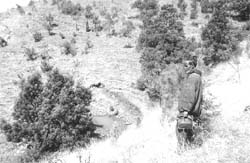A fighting chance
 nature has a way of moderating the effects of good and evil. Down the years humankind has demonstrated a general disregard for natural resources and often exploitated bio-diversity to the hilt. Fortunately, this has been coun-tered by a few dedicated people engaged in protecting and conserving nature without any ulterior motive. Former army regular Soban Singh Bhandari is from the latter category.
nature has a way of moderating the effects of good and evil. Down the years humankind has demonstrated a general disregard for natural resources and often exploitated bio-diversity to the hilt. Fortunately, this has been coun-tered by a few dedicated people engaged in protecting and conserving nature without any ulterior motive. Former army regular Soban Singh Bhandari is from the latter category.
Bhandari belongs to Nagchaund village in Tehri district of Uttar Pradesh - 40 km from the controversial Tehri dam. This was the most eroded and deforested land in Tehri. On his retire-ment from the army and return to the village in 1987, Bhandari was con-fronted with fragmented forests, dried up water sources and unproductive terraced land.Besides, the village was left with only the aged, infirm and the children.
Six months into his retirement, he found himself catapulted into the pradhan's (head of the village pan-chayat ) seat. Though he was hesistant initially he found the office a perfect platform to spread his ideas for reformation. At a general meeting of villagers, Bhandari proposed utilising the Jawahar Rozgar Yojna scheme more productively, instead of squandering the funds on petty development projects. The village people responded by deciding to construct a community centre. The work was completed and he was amazed by the cooperation he received from them. The confidence he gained helped him to implement many developmental works for the village.
In 1990, forest department officials were surveying the area to implement a micro-watershed development pro-gramme. The officials visited many sites but they were unsuccessful in their efforts mainly due to a lack of coopera-tion from the village people. Then, Bhandari was introduced to the officials and following extended discussions they selected a 30-hectare barren piece of community land for the project.
To check uncontrolled grazing in the area the village people erected a wall around the site with funds from the watershed programme. Then post monsoon they would go on a plantation drive so that they could get sufficient fodder and fuel. Soon they found they had a green canopy and were getting enough fuel and fodder from their forest. Despite the size of their forest, the ecological effects were amazing. The moisture content of the area increased and water sources of the village were being recharged.
After the watershed programme was withdrawn, the village people were faced with the problem of how to maintain the protected land and wall. Since they had no surplus funds, Bhandari wanted to sell the fodder from the land and use the money for maintenance of the area. But the village was against this. However, when he sold the fodder for Rs 3,600 to the neighbouring village, they agreed with his idea. The money was used for development work
Next, Bhandari took up plantation work with the help of the community and together they covered most of the village wasteland with greenery. He trained the people in the proper technique of planting and digging ditches besides other agricultural practices. When the trees grew another problem arose - how were they to be saved from the summers? It was then decided that check dams would be constructed on dry streams and deep V-shaped slopes dug in the wastelands. Once the ponds were full and covered with polythene sheets, they are able to save sufficient water to tide over the summer period.
By these means the people had sufficient water for irrigation, recharging of water sources - both above and below the surface - besides maintaining the humidity of the soil. Bhandari has also assigned the village people the task of protecting specific pieces of land, trees and new plantations, besides having to deposit a stated amount as compensation for fodder. This compensation is used to fund community projects.
For his pioneering work, Bhandari has received numerous awards from the district magistrate, and various institu-tions and organisations. His work is a fine example of how honesty, deter-mination and commitment can change the picture beyond recognition.
Related Content
- Global Nutrition Report 2017: Nourishing the SDGs
- Dengue on rise, malaria on decline, say health stats
- The Year of Opportunity for a Sustainable Future
- Can’t win climate fight without India: US
- Bangladesh State of Environment Report: The Monthly Overview, November, 2014
- Bangladesh State of Environment Report: The Monthly Overview, October, 2014
